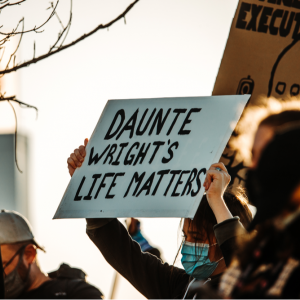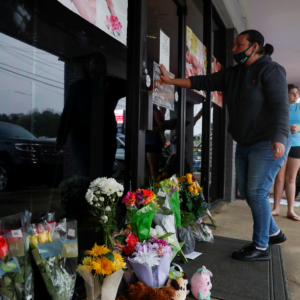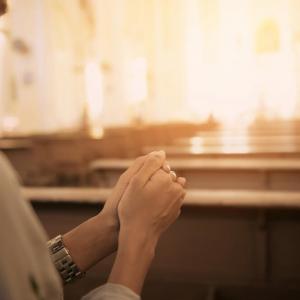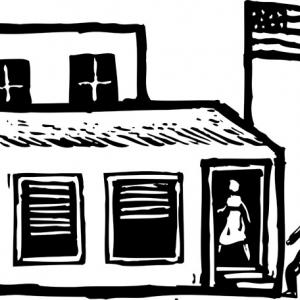
Angela Denker is a Lutheran pastor and veteran journalist. She's written for many publications, including Sports Illustrated, The Washington Post, and FORTUNE magazine. Denker has appeared on CNN, BBC and SkyNews to share her research on politics and Christian Nationalism in the U.S. Her book, Red State Christians: Understanding the Voters who elected Donald Trump, was the 2019 Silver Foreword Indies award-winner for political and social sciences. Her website is angeladenker.com.
Posts By This Author
Simone Biles Knows What Christians Too Often Forget
This is for you: for all of us who have watched as our bodies and our minds and our very being were commodified by the people in power, and even as we gained influence and strength, we knew our value hinged only upon what we might do, how we might produce, all the while knowing that a physical or mental collapse could hasten our own destruction. So we keep going.
Where's the Grace for Daunte Wright?
Christians talk a lot about grace but we don't seem to have the same grace for everyone in the U.S. I’ve heard people say they feel sick for former Brooklyn Center police officer, Kim Potter, who despite serving 26 years on the police force, claimed she grabbed her gun by mistake, killing Daunte Wright just 2.5 miles from the Brooklyn Center Community Center where I went with my church youth group as a kid. Potter seems to automatically receive a lot of grace from the same people who say if Wright had just followed instructions, he would still be alive.
The Deadly Consequences of Purity Culture and Hate
After his arrest, the man who confessed to shooting eight people told investigators that he suffered from sexual addiction and saw the massage parlors as “a temptation... that he wanted to eliminate.”
When Purity Culture's Gatekeepers Fail to Address Sexual Violence
The Evangelical women finding their voice in the #MeToo & #ChurchToo era.
To My Sisters in Ministry
As I watch these dynamic leaders suffer for their brilliance and their courage — as I watch you suffer for your calling to ministry — I have to point out that this is not a story about individual women. It's not only about me or about you. We are confronting a cancer of bias, a perhaps at times unconscious reaction to #MeToo and Trump's presidency and female gains in graduate school and income and costs of childcare and impossible parenting standards and devaluation of teachers and an impossibly toxic yet superficial social media environment.
God Was Not in the Whirlwind
I listen to the whirlwind: its commands and its shouts and its splitting mountains and breaking rocks in pieces. Whirlwinds shout in the world, from hurricanes and typhoons and earthquakes and podiums and Twitter and text messages. You get slowly sucked in until you are spinning, too, in the whirlwind, and gods are all around telling you to be louder and faster and better and both more ashamed and more bold all at once.
Forget the Billy Graham Rule. Let's Try the Good Friend/Mentor Rule
But the answer isn't an antiquated, unfair-to-women, patriarchal dividing of the sexes. It's not in a rule has nothing to do with Jesus and everything to do with male superiority complex, a devaluing of the human body, patriarchy, and oppression of women.
The answer is to lift up the men who get it, the men who love and respect women.
'We Are Heavily Armed. -The Pastors'
Who wouldn’t want to defend the right to a glorious eternity? Who wouldn’t fight to defend that salvation, wouldn’t carry a gun if that’s what they were told was necessary?
How You Know Jesus Has Left Your Church
Jesus has left your church when a woman is assaulted, but only men are allowed to speak publicly about it.
Zika, Love, and Motherhood

Image via vlavetal/Shutterstock.com
Diseases don't read, but they understand social contracts. They kill and maim the poorest and weakest among us first: pregnant women, people without air conditioning, people who have to store water outside in case of shortages, places where mosquitoes breed and grow and bite and viruses swarm the placenta and maim a growing baby's brain.
'Mommy, Don't Let the Sun Go Down on Your Anger'

Image via Catalin Petolea/Shutterstock
We think it's wrong for a woman, much less a mother, to be angry. And so when anger inevitably, righteously, hits us — with its cousin fatigue and its brother frustration — we don't know what to do except to bury it beneath a smile that gets thinner and weaker as the day winds on.
We all get angry, though. It is a function of being human, and I daresay without anger we would never have won women the right to vote, school desegregation, or any other host of advances that came about when people got righteously angry and unleashed the power of justice and the Holy Spirit.
So be angry when you are angry. The Bible says so. Do not be ashamed to say, in the moment, "This is not right. I'm angry."
July Was the Cruelest Month

Image via nanD_Phanuwat/Shutterstock
July is the cruelest month, with apologies to T.S. Eliot. ...
A movement has arisen in the past year to protest police brutality and the unjust killing of African Americans — an uncomfortable realization that the dream of civil rights has gone unrealized in a still-racist America. It's called Black Lives Matter, but in the summer of 2015, life seems cheap.
Recovering Providence in an Era of Christian Anxiety
Hand-wringing among religious folks has never been in short supply, but the doomdayers really had their day a couple of weeks ago, when the Pew Research Center confirmed what conventional wisdom has known now for decades.
We are in an age of post-Christendom — or, American adherents of Christianity continue to decline at a massive rate.
This is a case of statistics catching up with reality. For decades churches have been closing, Sunday Schools have been shrinking, and confirmation classes have been getting smaller. Especially among Catholics and mainline Protestants, the sky has been falling for many years. The right blames gay rights and liberal theology; the left blames hate speech and an overly doctrinal attitude.
Saying 'Peace, Peace,' When There Is No Peace
On Monday night as I read and watched the unfolding news coverage of riots, my Facebook newsfeed bombarding me with posts both from activists and from folks who hated the rioting but didn't care about Freddie Gray, I thought about saying a prayer for peace.
I started to pray, but God interrupted me, in the words of the prophet Jeremiah:
"They have treated the wound of my people carelessly,
saying 'Peace, peace,' when there is no peace.
They acted shamefully. They committed abomination.
Yet they were not ashamed."
Was I the “they?”
Who are God's people here?
Hozier's 'Take Me to Church' As a Holy Week Reflection
All Holy Week, I've been listening to Hozier's “Take Me to Church” — an odd sort of spiritual exercise, I suppose.
At first it was the hauntingly catchy refrain: “Take Me to Church” — and after all I would be going to church all week this week, the holiest of weeks in the Christian calendar. Maundy, or Holy, Thursday, Good Friday, Easter Vigil, Easter Sunday.
The refrain was jarring against the artist's desired impact of the song, that in fact no one would be taken to church, that no one would trust the institutional church that has proven so dogmatic, divisive, violent, and decidedly un-Christlike in its practice as to become "a fresh poison each week."
“Take Me to Church” is about sexuality, about dogma, about prayer, about worship, about heaven, hell, life, death, sacrifice, sin, confession, and absolution. It’s about Catholicism and Protestantism and Jesus and atheism and fear and hope and love.
We each see pieces of it. Many American viewers saw Hozier's music video and wrongly assumed he was gay — that the sum of his message was about the church's persecution of homosexuality. And even though Hozier is not gay, he did mean to indict the church for its horrible treatment of the LGBTQ community — but the message of his song goes beyond sexuality.
Hozier is an Irish singer, a man who grew up with the deadly legacy of Catholic-Protestant war, a man whose national church was beset by sexual abuse scandals and pews full of dogmatic believers who had never read the Bible. Masses in many cases were dominated by ritual and women and babies sent away to church-run facilities, like the one where the bodies of nearly 800 infants were recently found in an unmarked mass grave.
Americans can look on the Irish church with judgment, yet our own church scandals and hypocrisy can fill even more pages.
As a pastor looking toward Easter Sunday 2015, I see something else in these lyrics. I see and hear a deep longing. Not only for sex. But a longing for the God who came to earth in Jesus, who died and rose again because of love.
I asked colleagues and friends about their responses to this song, as it dominates airwaves during Holy Week, and no one seemed to want to broach the topic. Too sexual, some said. Another, that "it could not be redeemed." Another, that "people would be too offended."
In Celebration of the 'Average' Church
You may have never attended an "average" church, but you've certainly seen one. Older buildings, often made of dark brick, old-fashioned roofs that slope down from the center — possibly a bell tower and a steeple. St. Stephen's. Redeemer. Hope. Resurrection. St. Thomas. St. Vincent. Beautiful Savior. The names recall an age gone by — not just the 1950s, when neighborhoods walked together to Sunday morning worship, but also an age 2,000 years ago, when the world was changed by the witness of Stephen the martyr, and Jesus' resurrection from death on a cross in Jerusalem brought freedom and life to a world hungry for God's love and redemption.
If you've never been in an "average" church, or even if you have, long ago, you may wonder what it's still there for. The median American church has 75 regular participants in worship on Sunday morning. More than half of American congregations worship between 7-99 people each Sunday. They are strikingly homogeneous. In 2010, just 13.7 percent of congregations reported being "multiracial." Thirty percent of congregations still didn't have a website in 2010.
Reading these statistics, it may seem easy to despair — to drive by one church and then another, to attend worship there on Christmas Eve and wonder why you bothered.
What Families Want — And How the Church Can Help
Churches have spent millions attempting to cater to the needs of the young families in their communities.
"Come here! Bring your kids! We have a replica-sized Noah's Ark with real, live animals — a coffee shop that sells Pumpkin Spice lattes — cupholders in the chairs and state-of-the-art acoustics."
From a Millennial mom: this stuff is great. We like it, especially the lattes. But what we really want — what we really need — might not cost a thing.
When I started about a year ago as pastor of a small Lutheran church in the Chicago suburbs, one of my first priorities was to re-start the moms group that had been meeting at the church.
At one time it had served almost as a preschool drop-off. Later it had been held down by one mom and her friends, and as their children grew up no one came to fill the void.
I wanted to make it more than a drop-off, though — I wanted it to be Christian with a capital C. I made some tongue-in-cheek flyers with a black and white photo of a crying baby holding a Bible, and I called it Babies and Bibles.
Then, on a few Thursday mornings, I brought Jake to the church. A few curious moms emailed and showed up, but it never really took off.
Meanwhile, I missed the close-knit moms group I had in California, where Jake was born.
I was in the process of giving it all up for awhile, when one day as I drove to church God spoke to me:
"Why are you holding this at the church?" God asked. "It should be at your house."
3 Ways 'All Are Welcome' Is Hurting the Church
I see it on nearly every church sign, every church mailing; on the inside fold of every bulletin:
All Are Welcome!
Worship at 9 a.m. Sunday, All Are Welcome!
Potluck Dinner at 5 p.m. Saturday, All Are Welcome!
Vacation Bible School 9 a.m. Monday - Friday, All Are Welcome!
As the pastor of a Lutheran congregation outside Chicago, I find myself tagging it on — almost thoughtlessly — to our invitation cards and mailings as well.
It's almost an auto-signature for churches today: “All Are Welcome!”
And the impulse is a good one. For centuries the church has been exclusive rather than inclusive, despite Jesus' desire to the contrary. We have excluded women, African Americans, immigrants, gays and lesbians, people with special needs, senior citizens, singles, 20-somethings — at times the church has been downright discriminatory.
A friend of mine once told me he was desperate to find a church where he could not only worship but perhaps join the choir and get involved with music ministry. He brought his friend, another professional musician, to check out area churches. They found one they liked and were surprised when the minister asked them into his office. Ascertaining that they were both, indeed, gay, the minister said: "Well, you can attend. But just sit in the back row."
Thanks be to God, my friend didn't give up his search or lose his faith. He has since found an affirming congregation and leads incredible music there.
But too many of us have these stories: The congregation that saw single folks as irrelevant. The congregation that scorned Spanish-speaking immigrants. The place that found people with special needs disruptive.
Fortunately, many churches became aware of the way they had been contradicting the primary, freeing message of the Gospel: that all may be one in Christ Jesus, and that there is no longer Gentile or Jew, man or woman, black or white, slave or free, gay or straight, rich or poor ... (from Galatians 3:28).
As a needed corrective to become inclusive rather than exclusive, churches have hit upon a simple formula. It goes something like this: "Let's add ‘ALL ARE WELCOME’ to everything we publish. Let's make WELCOME the center of what we do."
Looking for God on Election Day
I'll never forget the time I was handed a Voting Guide when I walked into church on Sunday morning.
It was 2008 and I was a 23-year-old single woman, attending a large Southern Baptist congregation in Florida for the very first time.
The high school football coach I'd just written a profile on for the front page of the sports section had recommended I attend his church. He was, I'd ascertained, a good man and a genuine Christian. Plus, he and all the other football coaches from the area attended church here. There was the potential of additional scoops, plus an opportunity to make friends - or more - with some of the younger assistant coaches.
It was an impressive campus, all palm trees and white arches. We sang some familiar music, and to be honest, I don't even remember the sermon.
I remember the seemingly harmless Voters Guide. It was 2008. On the second page, listed in alphabetical order, was the man who would become our nation's first black president.
BARRACK OBAMA
It could've been a simple typo, an auto-correct. But as we were all told to bow our heads and pray for awhile to end abortion, I figured out this little Voters Guide might have a slight political agenda. And perhaps that little agenda might have contributed to them not bothering to spell the Democratic candidate's name correctly.
Much as I would have loved going to the church of the football coaches, I couldn't go back after that.
The Key to Real Community: Tear Down that Firewall
Yesterday morning at 5:30 I woke up to a disconcerting email:
Suspicious Sign-In Prevented. Please check your Google activity immediately.
In my half-asleep bleariness, I clicked the link and filled in my password.
Then I realized I'd been scammed.
"Recognize" was spelt "recognise" — and the account email was from Googlemail.com, not Google.com. Otherwise, the email was identical to those I'd gotten from Google in the past.
The next two hours were spent frantically re-securing my life. Changing passwords, adding two-step verification, application passwords.
I suddenly realized how much of my life was online. My Facebook page was a chronicle of my wedding, my jobs, my son's first 2 years of life.
Most people my age are the same way. Sometimes it's easier online.
The first people to find out about my pregnancy three years ago, besides my husband, were members of an online birth month group at WhattoExpect.com. Weeks before we told family or close friends, we shared intimate details about morning sickness, headaches, and faint lines on pregnancy tests.
Why do we do this? Somewhere, all of us, in Fantasy Football groups and pregnancy groups and dog lover groups and gluten-free groups: we're longing for Real Community.
















